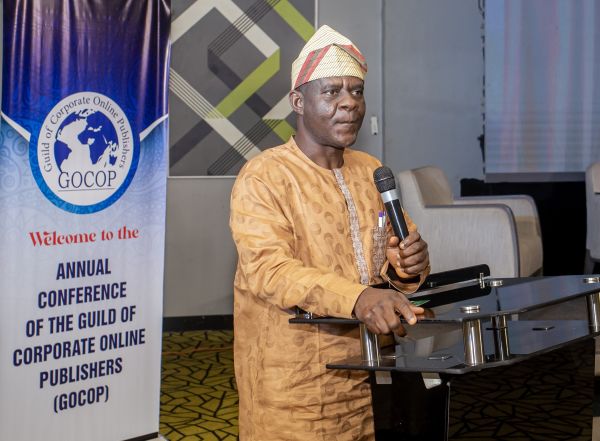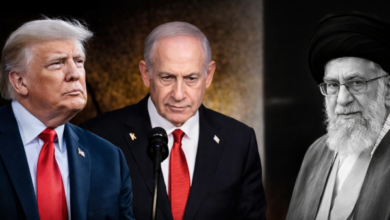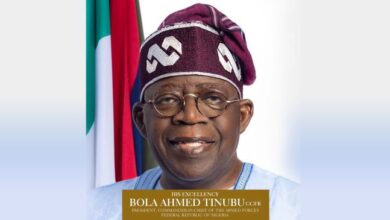GOCOP 2025: Mojeed Calls for Stronger Government Support to Empower Professional Journalists

Premium Times Editor-in-Chief warns against the widening gap between campaign promises and governance realities
In a powerful call to action for Nigeria’s democracy and media integrity, Muskilu Mojeed, Editor-in-Chief and Chief Operating Officer of Premium Times, has urged the Nigerian government to provide stronger, institutional support for professional journalism, arguing that the survival of democracy depends on a free, well-resourced, and technologically empowered press.
Mojeed made the call while speaking as a panelist at the 9th Annual Conference of the Guild of Corporate Online Publishers (GOCOP), held in Lagos under the theme: “Reconciling Campaign Promises with Governance Realities: Challenges and Prospects.”
The veteran journalist noted that despite the indispensable role of the media in deepening democracy, government support for the journalism profession in Nigeria has remained minimal, inconsistent, and often politicized.
“The truth is, everyone needs the media — especially those in power, and even more when they are out of power,” Mojeed remarked, drawing sustained applause from participants at the high-level gathering of Nigeria’s top online publishers, editors, and communication experts.
Media: The Pulse and Mirror of Democracy
Mojeed, a multiple award-winning investigative journalist and respected advocate of press freedom, described the media as both the pulse and mirror of a nation’s democracy — an institution that not only informs and educates citizens but also holds power accountable.
He stressed that if Nigeria must bridge the credibility gap between campaign rhetoric and governance outcomes, the media must be strengthened — not stifled.
“Journalists are the bridge between promises and reality. When they are disempowered, society loses its conscience,” he warned.
The Premium Times Editor-in-Chief highlighted how, over the years, the Nigerian media has consistently operated under difficult conditions — facing financial hardship, political intimidation, dwindling advertising revenues, and the rise of unregulated online misinformation.
He noted that while the government has occasionally extended relief measures to media organizations, such as COVID-19 debt waivers, these gestures are tokenistic compared to the structural support required to sustain independent journalism.
“Such palliatives, though commendable, are insufficient. The media industry needs a clear policy framework that recognizes journalism as a public good — one that deserves investment, protection, and modernization,” Mojeed added.
A Call for Policy-Backed Support and Technological Integration
Mojeed’s appeal comes at a time when Nigeria’s media ecosystem is under immense pressure from digital disruption, rising costs of operation, and limited access to financing. He argued that government and private sector stakeholders must collaborate to create enabling policies that promote financial independence, ethical practice, and innovation within the media space.
He emphasized that journalists and publishers must also embrace technology — from data analytics to artificial intelligence — to stay competitive and relevant in an era where public attention is fragmented across digital platforms.
“Technology is not the enemy of journalism; it is the amplifier of truth,” he said. “We must use it to improve accountability, track campaign promises, fact-check claims, and reach citizens faster and more credibly.”
He encouraged media practitioners to take ownership of emerging digital tools and platforms that can improve newsroom efficiency, expand audience reach, and strengthen citizen engagement.
Mojeed particularly challenged the government to incentivize digital transformation in newsrooms, suggesting tax rebates, training grants, and infrastructure support to help professional journalists adapt to the changing media economy.
Leadership and Accountability: A Disconnect That Demands Scrutiny
Turning to the broader theme of governance, Mojeed lamented the widening disconnect between campaign promises and actual performance by elected officials. He observed that many politicians enter office unprepared for the complex demands of governance, resulting in unmet expectations and public disillusionment.
“We have seen a pattern where politicians make lofty promises during elections without any realistic understanding of how to implement them,” he said. “The media must take the responsibility of interrogating those promises even before they are made, so citizens know what is possible and what is mere rhetoric.”
He called on journalists to go beyond event reporting and become policy translators and accountability partners — breaking down manifestos, comparing them with budgetary allocations, and tracking delivery metrics.
Such proactive journalism, he said, would strengthen public trust, promote policy literacy, and encourage leaders to prioritize truth over populism.
GOCOP and the Future of Professional Online Journalism
The Guild of Corporate Online Publishers (GOCOP), which brings together owners and editors of credible online media platforms, has grown into one of the most respected voices for professional standards in digital journalism.
This year’s conference, which attracted senior government officials, media executives, civil society leaders, and academics, provided a platform for critical dialogue on governance, transparency, and the role of the media in national development.
Mojeed’s intervention resonated deeply with attendees, many of whom agreed that without sustained investment in credible journalism, misinformation would continue to dominate the information ecosystem — undermining democracy and public trust.
“When truth becomes unaffordable, democracy becomes unsustainable,” one participant observed, echoing Mojeed’s central message.
Strengthening the Social Contract Through Media Empowerment
In his closing remarks, Mojeed emphasized that supporting journalists is not charity — it is an investment in national stability.
He urged the Nigerian government, corporate organizations, and international partners to view journalism as a key pillar of national development, not an adversary to political power.
He also called for more collaboration between the media, civil society, and academic institutions to build data-driven reporting models that link governance outcomes to citizen welfare.
“A well-supported media sector will not only expose corruption but also showcase innovation, resilience, and excellence,” he said. “The future of Nigeria’s democracy depends on the truth we defend and the journalists we empower.”











